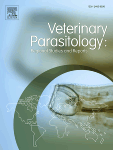Ver ítem
- xmlui.general.dspace_homeCentros e Institutos de InvestigaciónCIAP. Centro de Investigaciones AgropecuariasInstituto de Investigación Animal del Chaco SemiáridoArtículos científicosxmlui.ArtifactBrowser.ItemViewer.trail
- Inicio
- Centros e Institutos de Investigación
- CIAP. Centro de Investigaciones Agropecuarias
- Instituto de Investigación Animal del Chaco Semiárido
- Artículos científicos
- Ver ítem
First record of clinical coccidiosis (Eimeria ovinoidalis) in adult sheep from northwestern Argentina
Resumen
Coccidiosis of sheep is an intestinal infection caused by protozoa of the genus Eimeria. An outbreak of the disease in adult sheep from Salta province, northwestern Argentina, was studied to establish its clinical, epidemiological, pathological and etiological aspects. The affected animals were part of a flock of 20 sheep brought from Formosa province about 10 days before. Most sheep (80% incidence) showed hemorrhagic diarrhea, dehydration and loss of
[ver mas...]
Coccidiosis of sheep is an intestinal infection caused by protozoa of the genus Eimeria. An outbreak of the disease in adult sheep from Salta province, northwestern Argentina, was studied to establish its clinical, epidemiological, pathological and etiological aspects. The affected animals were part of a flock of 20 sheep brought from Formosa province about 10 days before. Most sheep (80% incidence) showed hemorrhagic diarrhea, dehydration and loss of body condition; six of them died and two that became permanently recumbent were euthanized. Three necropsied sheep showed mild mesenteric lymphadenomegaly, diffuse proliferative enteritis in the small and large intestines, and mucosal thickening. Histopathological studies exhibited diffuse proliferative enteritis and presence of structures compatible with intracellular coccidia at different stages of development. Parasitological studies (n = 12) resulted in an average of 16,636.6 (± 15,266.8) Eimeria oocysts per gram of feces (range 1680-46,400). Taxonomy of Eimeria species based on analysis of sporulated oocysts derived from 4 fecal samples (n = 100 oocyst per sample) showed, on average, a high prevalence of E. ovinoidalis (61.5%), followed by E. parva (27.2%), and lower proportions of E. crandallis (5.3%), E. ahsata (3.2%) and E. intricata (2.8%). Clinical and pathological findings confirmed the diagnosis of coccidiosis in the affected sheep; parasitological results showed that E. ovinoidalis was the main species responsible for the clinical signs. Clinical coccidiosis is considered unusual in adult sheep, but the present case shows that under favorable environmental and/or management conditions, this infection may be highly deleterious for adult sheep.
[Cerrar]

Autor
Olmos, Leandro Hipolito;
Colque Caro, Luis Adrián;
Avellaneda Cáceres, Agustín;
Medina, Diego M.;
Sandoval, Gabriela V.;
Aguirre, Daniel Hector;
Micheloud, Juan Francisco;
Fuente
Veterinary Parasitology: Regional Studies and Reports 21 : 100429 (July 2020)
Fecha
2020-07
Editorial
Elsevier
ISSN
2405-9390
Formato
pdf
Tipo de documento
artículo
Palabras Claves
Derechos de acceso
Restringido
 Excepto donde se diga explicitamente, este item se publica bajo la siguiente descripción: Creative Commons Attribution-NonCommercial-ShareAlike 2.5 Unported (CC BY-NC-SA 2.5)
Excepto donde se diga explicitamente, este item se publica bajo la siguiente descripción: Creative Commons Attribution-NonCommercial-ShareAlike 2.5 Unported (CC BY-NC-SA 2.5)

